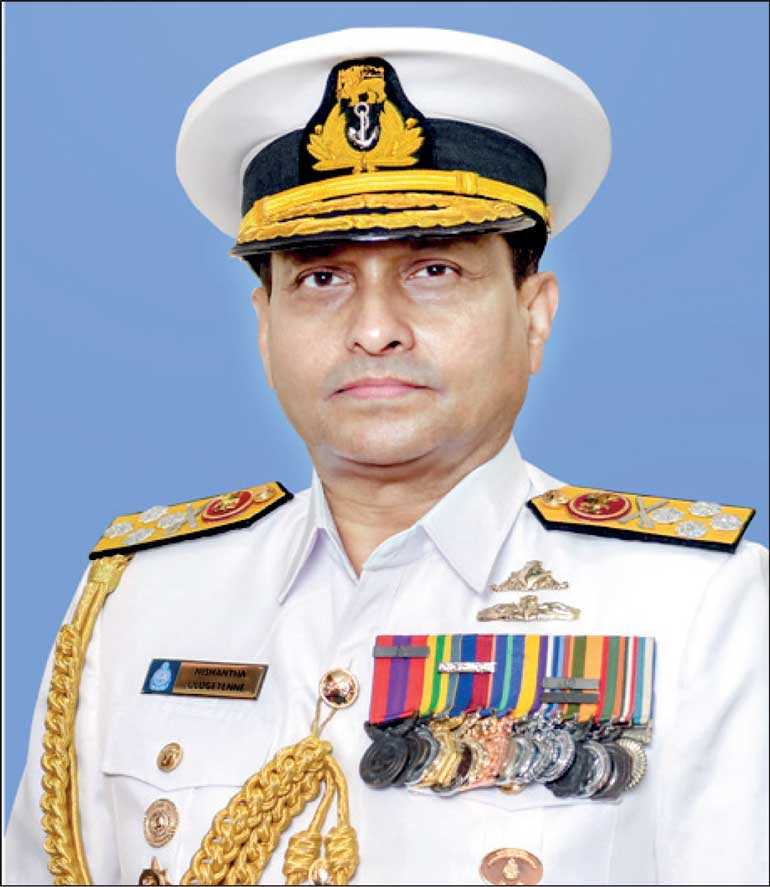Monday Feb 16, 2026
Monday Feb 16, 2026
Wednesday, 13 August 2025 00:30 - - {{hitsCtrl.values.hits}}

Former Navy Commander Admiral Nishantha Ulugetenne
This article is written in response to the following:
https://www.ft.lk/opinion/Defence-Ministry-has-its-say-over-remanding-of-former-Navy-Commander-Ulugetenne/14-779939
https://www.ft.lk/opinion/Letter-of-concern-to-Defence-Secretary-over-arrest-of-former-Navy-Chief/14-779697
 The Defence Ministry’s statement on the arrest of former Navy Commander Admiral Nishantha Ulugetenne reduces a serious constitutional and security matter to a public relations slogan “The law applies equally to all.” That is not a legal conclusion, in the military context equality before the law does not erase jurisdictional boundaries. Military law exists not to place service members above accountability but to ensure that offences committed in service or in connection with service are tried within the statutory framework designed to protect both national security and operational integrity.
The Defence Ministry’s statement on the arrest of former Navy Commander Admiral Nishantha Ulugetenne reduces a serious constitutional and security matter to a public relations slogan “The law applies equally to all.” That is not a legal conclusion, in the military context equality before the law does not erase jurisdictional boundaries. Military law exists not to place service members above accountability but to ensure that offences committed in service or in connection with service are tried within the statutory framework designed to protect both national security and operational integrity.
At the heart of this case is a decisive legal question Did the alleged offence occur during service and in connection with operational duties? If yes, the Navy Act No. 34 of 1950 Sections 34 and 131 applies without question and the proper forum is a court martial If no civilian courts retain jurisdiction. This is not a matter of preference it is the law
The decisive factor here is not public opinion media noise or even the Defence Ministry’s soundbite. It is the B Report submitted by the CID to the Magistrate’s Court. That document determines how jurisdiction is framed in law. By classifying the alleged offence as a personal matter unrelated to naval service the CID effectively removed the Navy Act from the process and moved the case into civilian jurisdiction.
If the CID’s classification is wrong bypassing military law would be a procedural breach with serious implications for state security. If it is right the Navy stands correctly excluded. But that determination cannot be left solely to the CID, a civilian investigative body operating under the Inspector General of Police most likely advised by a Defence Ministry legal division that itself appears to be civilian in composition. Neither the CID nor the IGP has statutory power to overrule or nullify military jurisdiction created by an Act of Parliament.
The CID is not the supreme authority in criminal matters. It is a branch of the Sri Lanka Police commanded by the IGP tasked with investigating facts not deciding law. Yet here under police administration the CID has stepped outside its investigative role and assumed a power it does not possess deciding that the Navy Act does not apply. This is not mere overreach it is jurisdictional overreach that risks undermining the separation between military and civilian legal spheres.
The danger is twofold. First it creates a precedent whereby any sensitive case involving a senior military officer could be routed through the CID to bypass court martial procedures entirely. Second it allows the IGP’s administrative control to become the de facto gatekeeper of military law by virtue of the CID’s classification in the B Report. This is a direct encroachment on the armed forces’ legal sovereignty.
In its clarification to me the Defence Ministry claimed that the Navy Act does not apply because Admiral Ulugetenne is now retired. That position collapses under the weight of binding Supreme Court precedent.
In SC FR 556 2009 Captain AD Senaratne de Silva v Military Police and others, a bench comprising Priyantha Jayawardena PC J, author B.P. Aluwihare PC J, and P. Padman Surasena J – now the Chief Justice of Sri Lanka, upheld the military’s right to proceed under the Army Act for offences committed during service even if the proceedings or arrest occurred later.
The Court’s logic was clear jurisdiction is determined by when the alleged offence occurred not the officer’s status on the day of arrest or trial. If the act happened in service and in connection with service duties the relevant Service Act Army Navy or Air Force applies in full Retirement does not erase that jurisdiction.
To accept the Defence Ministry’s position would create a dangerous loophole any officer facing allegations could be retired to block the Service Act and avoid court martial. This would strip the armed forces of internal disciplinary control and hand ultimate authority to civilian police undermining the very purpose of the Navy Act.
The triggering of the Navy Act in such cases is not optional. It is a statutory duty. The chain of command is clear.
1. Commander of the Navy: First responsibility to assess if the alleged act is service connected
2. Navy Legal Division: Formal legal review on jurisdictional applicability
3. Defence Ministry: Direction to enforce military jurisdiction where applicable
4. Attorney General: Final legal oversight ensuring statutory compliance
If all four remain silent when a case potentially within the Navy Act is moved into civilian court, the silence is not procedural it is institutional inaction.
The President is both Commander in Chief of the armed forces and head of the civilian executive. When a jurisdictional conflict arises between military law and civilian courts, the Commander in Chief is the only constitutional authority capable of bridging both spheres.
The judiciary hears what is presented before it. It does not initiate charges frame jurisdiction or draft B Reports. That process begins within the executive specifically within the Defence Ministry the CID under police administration and the Attorney General’s Department. The Commander in Chief must ensure that what is presented to the judiciary is legally and jurisdictionally correct before it ever reaches a court.
The Navy Act is not ceremonial. It is a wartime safeguard designed to protect the chain of command classified information and operational sovereignty. A former Director of Naval Intelligence carries classified operational knowledge from the nation’s war years.
Trying such a figure in a civilian court without the protective procedures of a military tribunal risks exposing operational secrets in open court. Civilian trials are not bound by the same security protocols as courts martial. The risk is not theoretical it is operational.
If the B Report’s personal matter classification is correct then the Navy stands rightly excluded. But if that classification is wrong, if the act is linked to service, then what we have witnessed is not just a procedural issue but a significant bypass of the Navy Act under police administration.
This case is not about Admiral Ulugetenne as an individual. It is about the integrity of the chain of command and the protection of national security mechanisms. If a precedent is set that allows the CID to bypass the Navy Act without challenge, future commanders will serve under the shadow of politicised scrutiny knowing that operational decisions made in war could later be second guessed in a civilian dock.
That is not just demoralising It is strategically dangerous.
The law is equal for all but the law is also structured. Equality before the law does not mean the abolition of jurisdictional limits. It means applying the right law in the right forum.
If the B Report is correct, the Navy stands rightly excluded. If it is wrong, then the CID’s action under police administration is a procedural bypass of the Navy Act that undermines military sovereignty and emboldens external pressures already seeking to weaken Sri Lanka’s defence structures.
If this is not clarified and resolved without delay, public interest litigation will follow to compel full disclosure of how this procedure was applied by whom and whether any jurisdictional safeguard was bypassed.
In such a war on jurisdiction silence is not neutrality. It is surrender.
This analysis is based on publicly available information, legal provisions, and reported facts at the time of writing. It is intended for public discussion and policy debate, not as a statement of guilt or innocence regarding any individual. All references to persons, institutions, or proceedings are in the context of jurisdictional, constitutional, and national security considerations. The views expressed are solely those of the author and do not represent any final judicial or official determination.